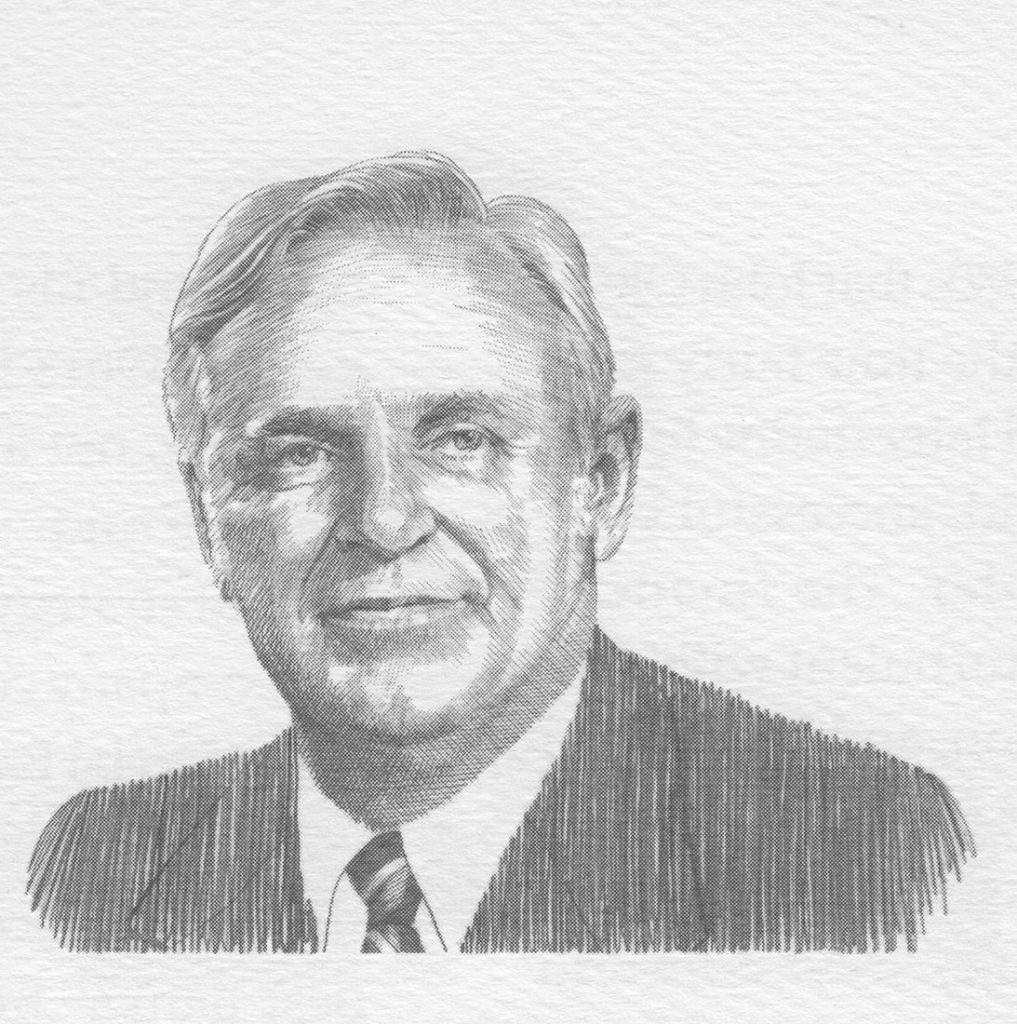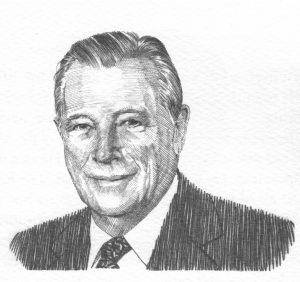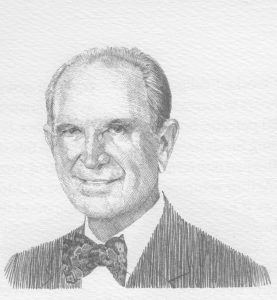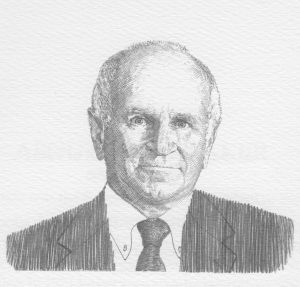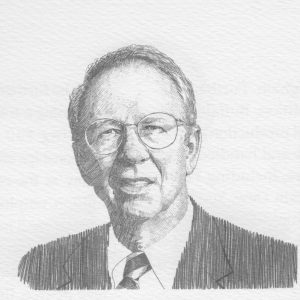Arthur Outlaw is a man whose roots run deep in lower Alabama: the first elected mayor of Mobile in the latter half of the 20th century, the impact he made on that city’s political and business communities have forever made his name synonymous with success in Alabama’s port city.
Born September 8, 1926, to parents Mayme Lily Ricks and George Cabell Outlaw, Sr., Arthur Robert Outlaw lived on a farm outside Mobile until his family’s move into the city when he was 14. Arthur’s father Cabell was one of the founding fathers of Morrison’s Cafeteria in 1920 and an exemplary role model for his son to follow. In his early years, Arthur received a Catholic education through his second year of high school at the McGill Institute before transferring to Riverside Military Academy in Georgia. The man who would later give hope to Mobilians and rebuild their shaken trust in local government enlisted in the U.S. Air Force Cadet Program after his 1945 graduation and served his country for two years during World War II.
Arthur left the military in 1947 to attend The University of Alabama, where he studied for one year before completing a business degree at Spring Hill College in Mobile. His friends are quick to point out that the degree should have been in golf, for although it was not Arthur’s formal course of study, he excelled in it to such a degree that his alma mater’s golf team had an undefeated season his senior year. And while he is proud of that college accomplishment, Arthur himself is quick to point out that it was not his greatest one while at “The Hill”: that, he says, was marrying Dorothy (Dot) Smith on November 23, 1949. The couple would go on to have three children – son A. Robert Outlaw, Jr. and daughters Karen Outlaw and Mary Gay Outlaw.
While still a college student, the already ambitious Arthur took a position with the Mobile accounting firm of Holiman, Childree, and Ramsay, which held the Morrison’s account. He quickly advanced, and after graduation was employed full-time. It wasn’t long before this aggressive young businessman joined the Morrison organization itself, as a full-time assistant auditor in 1951. His initial work centered on modernizing the company’s accounting system, and later he enlisted IBM to help structure payrolls and handle food inventory and billing for warehouses. This technologically advanced arrangement occurred long before the computer age, marking Arthur as an executive with a great deal of foresight.
As he made his way up Morrison’s career ladder, Arthur found himself increasingly interested in politics. In 1964, while serving as assistant secretary and treasurer for Morrison’s, Arthur was also an adviser to Republican Jim Martin in Martin’s bid to unseat long-time U.S. Senate Democrat Lister Hill. Although Arthur’s man lost the race by a narrow margin, the race made a lasting and dramatic impact on the development of an active Republican Party in Alabama.
That same year, Arthur endured another loss – one of a more personal and tragic nature – when his beloved father passed away. Despite all this, Arthur refused to accept defeat, coming back in 1964 to help prominent Republican Jack Edwards in his successful bid that year for Congress. Then in 1965, taking a leave of absence from Morrison’s to run his own campaign, Arthur defeated eight opponents and took office as public safety commissioner of Mobile. For four years Arthur worked diligently with his fellow commissioners to increase the city’s revenues by some 60 percent, revising the gas tax and redistributing funds based on a per-capita system. But after just one term, at the urging of his brother Arthur returned to Morrison’s in 1969. And as if he had never left, within four years Arthur was named secretary and treasurer of the company. The next decade marked a period of exceptional growth for Morrison’s, which grew to encompass more than 100 cafeterias; a food service division with contracts with health care industries and hospitals, schools, and even movie sets; Admiral Benbow Inns; Morrison Imperial House Restaurants; and food service equipment companies. With its warehouses, coffee plant, Morrison Assurance Company, and plants for the manufacture of stainless steel, furniture, and china, Morrison’s became the most vertically integrated company in its industry.
In a display of remarkable business acumen, in 1982 Arthur supported Morrison’s acquisition of fledgling restaurant chain Ruby Tuesday, which at that time consisted of 12 units. Arthur’s vision of expanding the business his father founded quickly became a reality, and today there are more than 350 Ruby Tuesday locations. In 1984, Arthur was appointed vice-chairman of the board of Morrison’s, and while this was a major step in his business career, the Mobilian’s strong devotion to his city would again lead him into local politics. He easily found success when he ran for the post of city finance commissioner, serving out the term of the incumbent who had been ousted from office – and jailed – for fraud and extortion. Arthur was quoted at the time as saying, “None of us are very proud of the events that have taken place in the last few months, and we are certainly concerned about the image it has projected on our fine city I cannot sit on the sidelines.”
During his seven-month term, Arthur worked with the state legislature to change Mobile’s form of government to a mayor/council system instead of one based on three commissioners. Following the city residents’ vote to make this change, Arthur ran for mayor in 1985 and won, becoming the first elected mayor of Mobile since 1911. A local who understood the needs of his community and envisioned reviving the declining city, Arthur’s eight-year strategic plan for Mobile included the downtown redevelopment of a waterfront convention center, constructing a naval home port, solving the stormwater drainage problem, and developing a “Keep Mobile Beautiful” campaign. After breathing life back into his hometown during his one term as mayor, Arthur returned in 1989 to the family business, now Morrison Restaurant, Inc., as vice-chairman of the board, which is where he remains today. Seven years after his departure from politics, his company was spun off into three independent entities: Morrison Fresh Cooking, Inc.; Morrison Health Care, Inc.; and Ruby Tuesday, Inc. Arthur also currently serves as vice-chairman of the Ruby Tuesday Board of Directors.
Arthur’s successes also continued on the personal front. He was awarded an Honorary Doctorate of Humane Letters from the University of Mobile in May 1994 and was appointed to the Board of Directors of the Alabama Institute for the Deaf and Blind in 1995, two additions to a list including well more than 15 civic and service appointments and accomplishments.
His friends say, Arthur Outlaw, with all of his personal and professional successes, hasn’t changed much over the years. Throughout his triumphs as both businessman and politician, he has remained loyal to his principles and fought for his beliefs. “I believe I’ve spent the majority of my career working on problems I see as solvable,” Arthur once said. “If a problem is solvable, a little action will usually uncover the necessary solution.”
Arthur Outlaw’s life has been one of just such action, and he will be remembered for the problems he solved.

